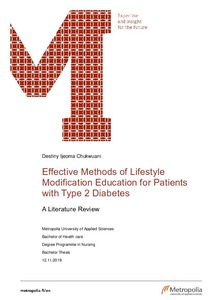Effective Methods of Lifestyle Modification Education for Patients with Type 2 Diabetes
Chukwuani, Ijeoma Destiny (2019)
Chukwuani, Ijeoma Destiny
2019
All rights reserved. This publication is copyrighted. You may download, display and print it for Your own personal use. Commercial use is prohibited.
Julkaisun pysyvä osoite on
https://urn.fi/URN:NBN:fi:amk-2019120324368
https://urn.fi/URN:NBN:fi:amk-2019120324368
Tiivistelmä
Diabetes is one of the most common non-communicable diseases and type 2 diabetes account for majority of the cases. The rise in the rate of obesity together with the aging of worlds’ population, implies that type 2 diabetes will be more than half of new diabetes cases. Lifestyle interventions have shown to reduce the incidence of type 2 diabetes, and can also increase the quality of life of patients. Nurses are required to educate and guide patients make this lifestyle modifications.
The purpose of this literature review was to describe lifestyle-related patient education methods beneficial in eliciting positive lifestyle modifications in patients with T2DM. The aim is to develop evidence-based lifestyle modification education for patients with type 2 diabetes.
In this bachelor thesis, PubMed and CINAHL databases were used to search articles to provide answers to the research questions. The search yielded articles of which eleven articles were selected, analysed and categorised in a systematic manner using the principle of inductive content analysis. The findings were presented in a literature review.
Based on the reviewed literature, the findings were sub categorized into four (1) Experiential, (2) Telemedicine, (3) Multimedia and, (4) Web-based system and then divided into ten primary interventions. All these interventions where effective in eliciting lifestyle modifications.
Healthcare providers should consider the patient individually when planning the best method of teaching, taking into account patient’s health status, age, health literacy, abilities and adapt teaching styles to accommodate multimodal learning as acceptable. Further research on long time effect of these interventions is recommended.
The purpose of this literature review was to describe lifestyle-related patient education methods beneficial in eliciting positive lifestyle modifications in patients with T2DM. The aim is to develop evidence-based lifestyle modification education for patients with type 2 diabetes.
In this bachelor thesis, PubMed and CINAHL databases were used to search articles to provide answers to the research questions. The search yielded articles of which eleven articles were selected, analysed and categorised in a systematic manner using the principle of inductive content analysis. The findings were presented in a literature review.
Based on the reviewed literature, the findings were sub categorized into four (1) Experiential, (2) Telemedicine, (3) Multimedia and, (4) Web-based system and then divided into ten primary interventions. All these interventions where effective in eliciting lifestyle modifications.
Healthcare providers should consider the patient individually when planning the best method of teaching, taking into account patient’s health status, age, health literacy, abilities and adapt teaching styles to accommodate multimodal learning as acceptable. Further research on long time effect of these interventions is recommended.
